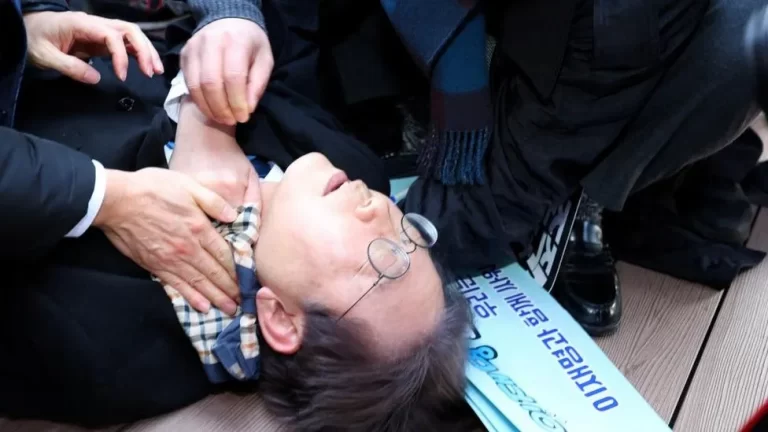South Korea's opposition leader Lee Jae-myung has been stabbed in the neck during a visit to the city of Busan.
Mr Lee, who narrowly lost the 2022 presidential election, sustained a 1cm laceration on the left side of his neck, reports said.
He was airlifted to hospital. Doctors say the wound is not life-threatening.
The 66-year-old man who attacked him said he had intended to kill Mr Lee, Yonhap news agency reported. The motive for the attack is unclear.
The brazen daytime attack shocked the nation and prompted condemnation from political parties and politicians, including current President Yoon Suk Yeol.
Mr Lee, who leads the Democratic Party of Korea, was addressing reporters at a news conference during a visit to a construction site in the port of Busan on Tuesday morning when the stabbing happened.
The attacker reportedly approached him to ask for an autograph, before suddenly lunging forward to stab him. The weapon was an 18cm (7in) knife which the attacker said he bought online, police said at a media briefing. The attacker was immediately overpowered and arrested.
Prosecutors plan to bring attempted murder charges against the man, Yonhap said.
Videos of the attack posted on social media show Mr Lee first collapsing into the crowd and then onto the ground, while several people try to restrain the attacker. Photographs after the incident show Mr Lee lying on the ground with his eyes closed as someone presses a handkerchief to the side of his neck.
A spokesman for Mr Lee's party said medical staff suspected injury to his jugular vein, which carries blood from the head to the heart. Mr Lee would have to undergo surgery as they were concerned about further bleeding, the spokesman, Kwon Chil-seung, said.
“After being transferred to Seoul National University Hospital, we plan to operate quickly. We strongly condemn the attack and consider it a clear act of democracy destruction,” he said.
Mr Lee, 59, currently holds a seat in Incheon in South Korea's legislature. He is widely expected to run for a seat in the next general election, which will take place in April.
He narrowly lost the 2022 presidential elections – by a mere 0.73% difference in votes – to Mr Yoon, making it the closest presidential race in South Korean history. He is widely expected to stand in the next presidential elections in 2027.
Since losing the vote, he has been indicted on corruption and breach of trust charges, with prosecutors accusing him of allowing private developers to profit illegally from a property project while he was mayor of Seongnam, a city of 1 million people to the south of Seoul. Mr Lee has denied those charges, calling them politically motivated.
In September a court dismissed a request from the prosecution for him to be held in custody while he awaited trial on the charges. Prosecutors are still investigating him on a number of other cases linked to corruption while he was in office.
The court's order came three weeks after Mr Lee staged a hunger strike to protest at Mr Yoon's foreign and domestic policies. Mr Lee required hospital treatment after not eating for 19 days.
South Korea's crime rate is generally low, although the country saw a rise in mass stabbing attacks last year. The country has strict regulations around possession of guns and other weapons, and most public figures are not usually under tight security protection.
There have been a number of previous cases of South Korean politicians being physically attacked with weapons.
In March 2022, Mr Lee's predecessor as Democratic Party leader, Song Young-gil, was attacked with a blunt object while campaigning for Mr Lee. He sustained a laceration.
In 2006, conservative party leader Park Geun-hye, who later became president, was attacked with a knife which left a scar on her face.
In 1979, her father Park Chung-hee, who was president for 16 years, was shot and killed by his spy chief at a private dinner.
— CutC by bbc.com


